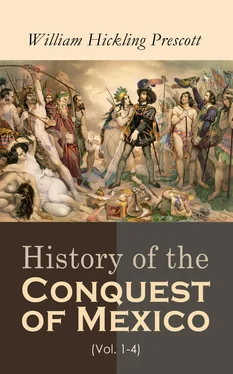On the following morning, as no traces of the enemy were visible, Cortés ordered out a detachment under Alvarado, and another under Francisco de Lujo, to reconnoitre. The latter officer had not advanced a league, before he learned the position of the Indians, by their attacking him in such force that he was fain to take shelter in a large stone building, where he was closely besieged. Fortunately, the loud yells of the assailants, like most barbarous nations seeking to strike terror by their ferocious cries, reached the ears of Alvarado and his men, who, speedily advancing to the relief of their comrades, enabled them to force a passage through the enemy. Both parties retreated, closely pursued, on the town, when Cortés, marching out to their support, compelled the Tabascans to retire.
A few prisoners were taken in this skirmish. By them Cortés found his worst apprehensions verified. The country was everywhere in arms. A force consisting of many thousands had assembled from the neighboring provinces, and a general assault was resolved on for the next day. To the general’s inquiries why he had been received in so different a manner from his predecessor, Grijalva, they answered that “the conduct of the Tabascans then had given great offence to the other Indian tribes, who taxed them with treachery and cowardice; so that they had promised, on any return of the white men, to resist them in the same manner as their neighbors had done.” [548]
Cortés might now well regret that he had allowed himself to deviate from the direct object of his enterprise, and to become entangled in a doubtful war which could lead to no profitable result. But it was too late to repent. He had taken the step, and had no alternative but to go forward. To retreat would dishearten his own men at the outset, impair their confidence in him as their leader, and confirm the arrogance of his foes, the tidings of whose success might precede him on his voyage and prepare the way for greater mortifications and defeats. He did not hesitate as to the course he was to pursue, but, calling his officers together, announced his intention to give battle the following morning. [549]
He sent back to the vessels such as were disabled by their wounds, and ordered the remainder of the forces to join the camp. Six of the heavy guns were also taken from the ships, together with all the horses. The animals were stiff and torpid from long confinement on board; but a few hours’ exercise restored them to their strength and usual spirit. He gave the command of the artillery—if it may be dignified with the name—to a soldier named Mesa, who had acquired some experience as an engineer in the Italian wars. The infantry he put under the orders of Diego de Ordaz, and took charge of the cavalry himself. It consisted of some of the most valiant gentlemen of his little band, among whom may be mentioned Alvarado, Velasquez de Leon, Avila, Puertocarrero, Olid, Montejo. Having thus made all the necessary arrangements, and settled his plan of battle, he retired to rest,—but not to slumber. His feverish mind, as may well be imagined, was filled with anxiety for the morrow, which might decide the fate of his expedition; and, as was his wont on such occasions, he was frequently observed, during the night, going the rounds, and visiting the sentinels, to see that no one slept upon his post.
At the first glimmering of light he mustered his army, and declared his purpose not to abide, cooped up in the town, the assault of the enemy, but to march at once against him. For he well knew that the spirits rise with action, and that the attacking party gathers a confidence from the very movement, which is not felt by the one who is passively, perhaps anxiously, awaiting the assault. The Indians were understood to be encamped on a level ground a few miles distant from the city, called the plain of Ceutla. The general commanded that Ordaz should march with the foot, including the artillery, directly across the country, and attack them in front, while he himself would fetch a circuit with the horse, and turn their flank when thus engaged, or fall upon their rear.
These dispositions being completed, the little army heard mass and then sallied forth from the wooden walls of Tabasco. It was Lady-day, the twenty-fifth of March,—long memorable in the annals of New Spain. The district around the town was checkered with patches of maize, and, on the lower level, with plantations of cacao,—supplying the beverage, and perhaps the coin, of the country, as in Mexico. These plantations, requiring constant irrigation, were fed by numerous canals and reservoirs of water, so that the country could not be traversed without great toil and difficulty. It was, however, intersected by a narrow path or causeway over which the cannon could be dragged.
The troops advanced more than a league on their laborious march, without descrying the enemy. The weather was sultry, but few of them were embarrassed by the heavy mail worn by the European cavaliers at that period. Their cotton jackets, thickly quilted, afforded a tolerable protection against the arrows of the Indians, and allowed room for the freedom and activity of movement essential to a life of rambling adventure in the wilderness.
At length they came in sight of the broad plains of Ceutla, and beheld the dusky lines of the enemy stretching, as far as the eye could reach, along the edge of the horizon. The Indians had shown some sagacity in the choice of their position; and, as the weary Spaniards came slowly on, floundering through the morass, the Tabascans set up their hideous battle-cries, and discharged volleys of arrows, stones, and other missiles, which rattled like hail on the shields and helmets of the assailants. Many were severely wounded before they could gain the firm ground, where they soon cleared a space for themselves, and opened a heavy fire of artillery and musketry on the dense columns of the enemy, which presented a fatal mark for the balls. Numbers were swept down at every discharge; but the bold barbarians, far from being dismayed, threw up dust and leaves to hide their losses, and, sounding their war-instruments, shot off fresh flights of arrows in return.
They even pressed closer on the Spaniards, and, when driven off by a vigorous charge, soon turned again, and, rolling back like the waves of the ocean, seemed ready to overwhelm the little band by weight of numbers. Thus cramped, the latter had scarcely room to perform their necessary evolutions, or even to work their guns with effect. [550]
The engagement had now lasted more than an hour, and the Spaniards, sorely pressed, looked with great anxiety for the arrival of the horse—which some unaccountable impediments must have detained—to relieve them from their perilous position. At this crisis, the farthest columns of the Indian army were seen to be agitated and thrown into a disorder that rapidly spread through the whole mass. It was not long before the ears of the Christians were saluted with the cheering warcry of “San Jago and San Pedro!” and they beheld the bright helmets and swords of the Castilian chivalry flashing back the rays of the morning sun, as they dashed through the ranks of the enemy, striking to the right and left, and scattering dismay around them. The eye of faith, indeed, could discern the patron Saint of Spain, himself, mounted on his gray war-horse, heading the rescue and trampling over the bodies of the fallen infidels! [551]
The approach of Cortés had been greatly retarded by the broken nature of the ground. When he came up, the Indians were so hotly engaged that he was upon them before they observed his approach. He ordered his men to direct their lances at the faces of their opponents, [552]who, terrified at the monstrous apparition,—for they supposed the rider and the horse, which they had never before seen, to be one and the same, [553]—were seized with a panic. Ordaz availed himself of it to command a general charge along the line, and the Indians, many of them throwing away their arms, fled without attempting further resistance.
Читать дальше












